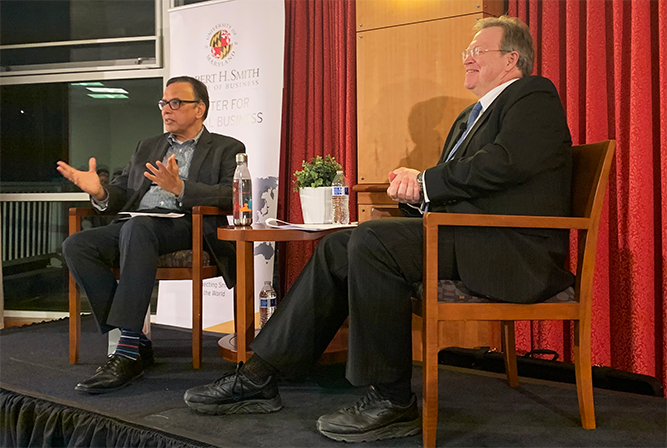
Kearney partner, speaking at Maryland Smith, outlines 10 predictions for the year ahead.
This year, you can expect new, innovative solutions to environmental crises, as well as a vigorous race, to get 5G up and running, Erik Peterson told an audience this week at the University of Maryland’s Robert H. Smith School of Business.
Peterson, a partner at Kearney and managing director of the firm’s Global Business Policy Council, presented the firm’s Year-Ahead Predictions for 2020 on Feb. 3, 2020, in a discussion with the center’s academic director, Kislaya Prasad. The event was part of the Distinguished Speaker Series in International Business hosted by Maryland Smith’s Center for Global Business.
Kearney’s report makes 10 predictions for the year, all of which would — for better or worse — alter global business practices.
Peterson expects the water crisis to inspire innovative new solutions.
“Our view is that, in the end, we’re going to be seeing these serious water issues on one hand, but on another hand, on the more positive side, companies, non-governmental organizations, scientists and others are coming up with much more efficient ways to make things happen,” Peterson said. Israel, for example, has used its water crisis to develop exemplary desalination and drip irrigation techniques.
Scientists expect water dislocations to result from rapidly shifting weather patterns, which will create drought conditions in Latin America and bring difficulties to Africa and South Asia. “We’re on a countdown right now,” Peterson said. “The water dislocations are going to be coming fast and furious.”
Peterson stressed the importance of taking an interest in water crises as they pertain to global business. “Think about it: Human health, the cohesion of societies, broader economics, these kinds of competing interests on limited water resources are going to get all the more difficult to sustain.”
Peterson also predicts the battle for 5G will be “one of the biggest proxies for national competition in the technology space.”
The latest generation of telecommunications is a hot topic for both the public and private sectors. While you might have seen the Verizon’s Super Bowl LIV commercial promoting their efforts to bring 5G to customers, you might not know what government agencies are doing behind the scenes to win the 5G race, Peterson said.
“Whoever can get to 5G first will have considerable advantages,” he said.
Government agencies worry about pushback from local communities. Known as the “not in my backyard” syndrome, communities often fight against the addition of power lines and telephone poles necessary to get 5G going in the United States.
“We’re beginning to see the signs in a kind of tech clash here between city and local officials and the community,” Peterson said. “The upshot here is that we may see slower-than-expected progress from people who don’t want towers in their backyards.”
"A general sense that I got when reading the report and talking to Erik was that the time of reckoning with the consequences of climate change is nearly upon us," Prasad said. "We see this in the prediction that the generational war will heat up - as will be evident to anyone who has been following Greta Thunberg. That cities will accelerate attempts to meet the climate challenge. That we will have to cope with water scarcity, and that a ‘disaster economy’ will emerge due to the more frequent natural disasters that we are experiencing."
Peterson also said he expects space to become more crowded, both with private sector players and new objects in the atmosphere.
“The number of players and space powers has multiplied quite considerably, on one hand,” he said, “but on the other hand, the number of companies in the mix has multiplied, as well. SpaceX is the one we’re all watching.”
With this addition of players in space, there comes a natural increase in the number of elements in space.
“There was a lot of stuff up there already,” Peterson said. “Now, we have to be tracking things very carefully. We have a lot of active and inactive objects that are encircling the planet in ways that are devastatingly difficult to control.”
“Please come back next year,” he said. “Let us know if we were right.”
This event was supported in part by CIBE, a Title VI grant provided by the U.S. Department of Education.
Media Contact
Greg Muraski
Media Relations Manager
301-405-5283
301-892-0973 Mobile
gmuraski@umd.edu
About the University of Maryland's Robert H. Smith School of Business
The Robert H. Smith School of Business is an internationally recognized leader in management education and research. One of 12 colleges and schools at the University of Maryland, College Park, the Smith School offers undergraduate, full-time and flex MBA, executive MBA, online MBA, business master’s, PhD and executive education programs, as well as outreach services to the corporate community. The school offers its degree, custom and certification programs in learning locations in North America and Asia.